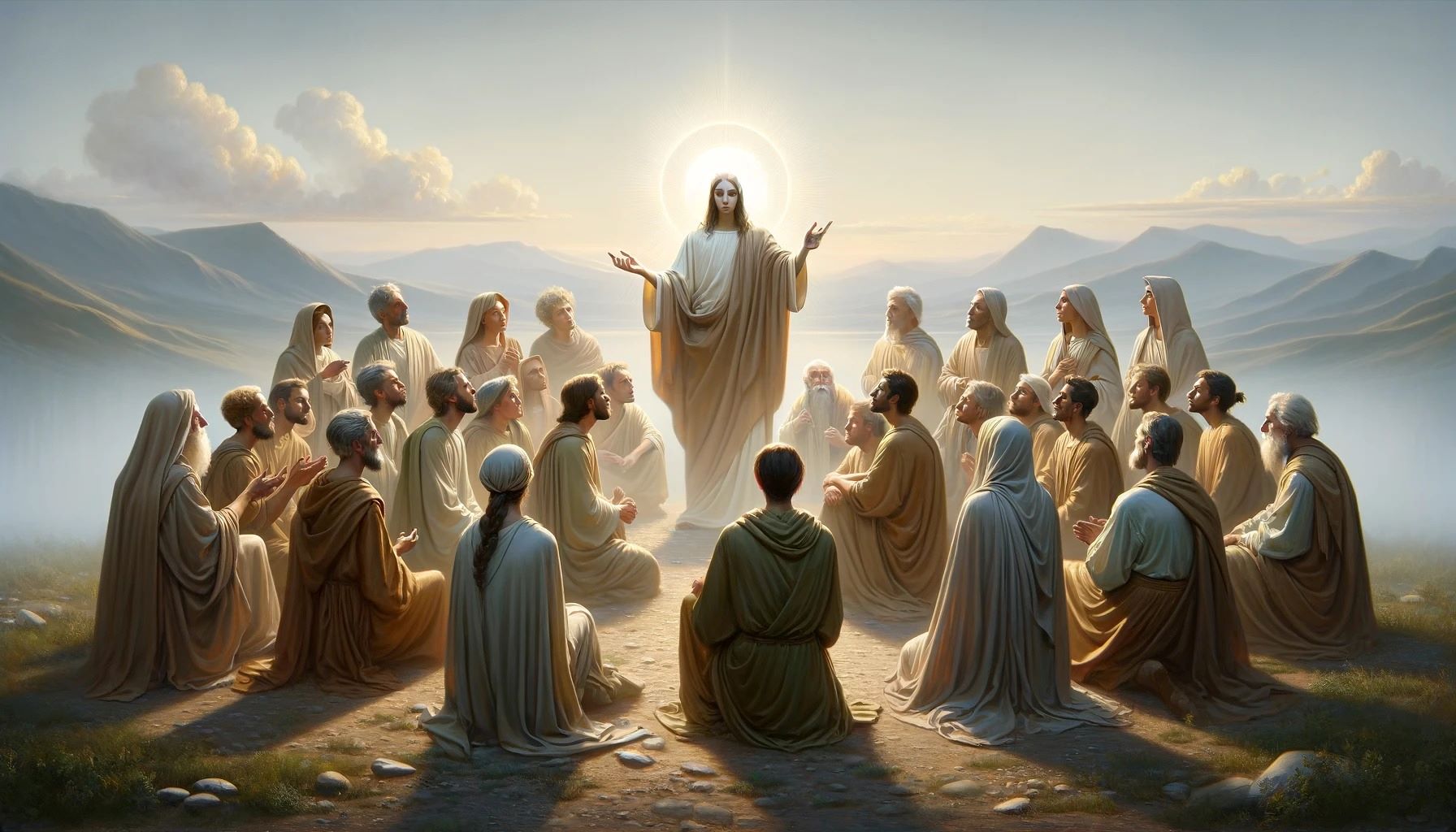Home>Christian Videos>Bible Stories>Why Did God Send Jesus Christ To Earth


Bible Stories
Why Did God Send Jesus Christ To Earth
Published: March 3, 2024
Ericka Andersen, an editor at Christian.net, expertly merges digital strategy with content creation, focusing on faith and societal issues. Her communication skills enhance the platform's engaging narratives, fostering meaningful dialogue on belief's impact on society.
Discover the significance of God sending Jesus Christ to Earth in this insightful exploration of Bible stories. Uncover the divine purpose behind this pivotal event.
(Many of the links in this article redirect to a specific reviewed product. Your purchase of these products through affiliate links helps to generate commission for Christian.net, at no extra cost. Learn more)
Table of Contents
The Purpose of Jesus Christ's Mission
The purpose of Jesus Christ's mission on earth was to fulfill the divine plan of salvation for humanity. According to Christian belief, Jesus came to reconcile humanity with God, to offer redemption and forgiveness of sins, and to demonstrate God's love and mercy. His mission was to serve as the ultimate sacrifice, atoning for the sins of humanity and providing a path to eternal life. Through his teachings, miracles, and ultimately his death and resurrection, Jesus aimed to bring about spiritual transformation and offer the gift of salvation to all who believe in him. His mission was to bring hope, healing, and restoration to a broken world, and to establish the Kingdom of God on earth.
-
Reconciliation with God: Jesus came to bridge the gap between humanity and God, offering a way for people to be reconciled with their Creator. His mission was to restore the relationship that was broken by sin, allowing individuals to experience the fullness of life in communion with God.
-
Redemption and Forgiveness: Jesus' mission included the redemption of humanity from the power of sin and the offer of forgiveness for all who repent. Through his sacrificial death on the cross, he provided a way for people to be freed from the burden of sin and its consequences.
-
Demonstration of God's Love: Jesus came to demonstrate the depth of God's love for humanity. His mission was a profound expression of God's mercy and compassion, showing that no one is beyond the reach of God's grace.
-
Establishment of the Kingdom of God: Jesus' mission also involved the proclamation and establishment of the Kingdom of God on earth. He taught about the principles and values of God's kingdom, calling people to live in accordance with God's will and to seek first the Kingdom of God.
-
Victory over Death: Through his resurrection, Jesus demonstrated his power over death and offered the promise of eternal life to all who believe in him. His mission was to conquer the forces of darkness and to bring about the hope of resurrection and new life for humanity.
In summary, the purpose of Jesus Christ's mission was to bring about the salvation of humanity, to reveal the love and mercy of God, and to establish the Kingdom of God on earth. His life, teachings, death, and resurrection were all part of this overarching purpose, demonstrating the depth of God's love and the extent of his desire to bring about the redemption and restoration of humanity.
Read more: Why Is Jesus Christ The Son Of God
The Role of Jesus Christ in God's Plan
-
The Mediator Between God and Humanity: Jesus Christ serves as the mediator between God and humanity, bridging the gap caused by sin and offering a way for people to be reconciled with their Creator. His role as the mediator is central to God's plan of salvation, as he represents the perfect union of divinity and humanity, making it possible for individuals to have direct access to God.
-
The Sacrificial Lamb: In God's plan, Jesus Christ plays the role of the sacrificial lamb whose death atones for the sins of humanity. As the ultimate sacrifice, his death on the cross provides the means for the redemption and forgiveness of sins, fulfilling the requirements of divine justice and offering a path to reconciliation with God.
-
The Incarnation of God's Love: Jesus Christ's role in God's plan also involves the incarnation of God's love for humanity. Through his life, teachings, and ultimately his sacrificial death, Jesus embodies the depth of God's love and mercy, demonstrating the extent to which God is willing to go to bring about the salvation of humanity.
-
The Fulfillment of Prophecy: Throughout the Old Testament, numerous prophecies foretold the coming of a Messiah who would bring about the redemption and restoration of God's people. Jesus Christ fulfills these prophecies, serving as the long-awaited Messiah who embodies the fulfillment of God's promises and the realization of his plan for the salvation of humanity.
-
The Establishment of the New Covenant: Jesus Christ's role in God's plan includes the establishment of the new covenant between God and humanity. Through his death and resurrection, he inaugurates a new era of grace and reconciliation, offering a way for people to enter into a renewed relationship with God based on faith, grace, and the indwelling of the Holy Spirit.
-
The Conqueror of Death: As part of God's plan, Jesus Christ's role also involves the conquest of death and the promise of eternal life. Through his resurrection, he demonstrates his victory over the powers of darkness, offering the hope of resurrection and new life to all who believe in him.
In summary, the role of Jesus Christ in God's plan is multifaceted, encompassing his role as the mediator, sacrificial lamb, embodiment of God's love, fulfillment of prophecy, establisher of the new covenant, and conqueror of death. His central position in God's plan of salvation underscores the depth of God's love for humanity and the extent to which he is willing to go to bring about the redemption and restoration of all who believe in him.
The Impact of Jesus Christ's Arrival on Earth
-
Transformation of Lives: Jesus Christ's arrival on earth had a profound impact on the lives of individuals. His teachings, miracles, and personal encounters brought about transformation in the hearts and minds of people. Many who encountered Jesus experienced a change in their perspectives, attitudes, and behaviors, leading to a renewed sense of purpose and hope.
-
Establishment of a New Way of Living: Jesus introduced a new way of living based on love, compassion, and forgiveness. His teachings emphasized the importance of loving one's neighbor, showing mercy to others, and living in harmony with God and fellow human beings. This new ethical framework revolutionized societal norms and continues to influence moral and ethical standards to this day.
-
Formation of a Community of Believers: The impact of Jesus Christ's arrival led to the formation of a community of believers who were united by their faith in him. This community, known as the early Christian church, became a powerful force for spreading the message of Jesus and demonstrating the transformative power of his teachings.
-
Challenging the Status Quo: Jesus' arrival challenged the existing religious and social structures of his time. His radical message of inclusivity, compassion, and spiritual renewal stood in stark contrast to the rigid legalism and exclusivity of the religious authorities. This challenge to the status quo ultimately led to his crucifixion but also laid the foundation for a new way of understanding and practicing faith.
-
Inspiration for Social Justice and Humanitarian Efforts: The impact of Jesus Christ's arrival continues to inspire movements for social justice and humanitarian efforts. His example of standing up for the marginalized, caring for the poor and oppressed, and advocating for the downtrodden has motivated countless individuals and organizations to work towards creating a more just and compassionate society.
-
Shaping Western Civilization: The arrival of Jesus Christ has had a lasting impact on the shaping of Western civilization. His teachings and the spread of Christianity have influenced art, literature, philosophy, and the legal and ethical frameworks of Western societies. The values of love, forgiveness, and human dignity that Jesus espoused continue to be foundational principles in Western culture.
-
Eternal Hope and Redemption: Perhaps the most profound impact of Jesus Christ's arrival is the eternal hope and redemption he offers to humanity. His sacrificial death and resurrection provide the promise of forgiveness, reconciliation with God, and the hope of eternal life. This message of hope has brought comfort and assurance to countless individuals throughout history, offering a sense of purpose and meaning in the face of life's challenges.
In summary, the impact of Jesus Christ's arrival on earth has been far-reaching, touching the lives of individuals, shaping communities, challenging societal norms, inspiring social justice efforts, influencing Western civilization, and offering the eternal hope of redemption. His presence continues to resonate across time and cultures, leaving an indelible mark on the course of human history.
The Redemption and Salvation Offered Through Jesus Christ
The redemption and salvation offered through Jesus Christ are central themes in Christian theology. According to Christian belief, Jesus' sacrificial death on the cross serves as the ultimate act of redemption, providing a way for humanity to be reconciled with God and offering the gift of salvation. This redemptive work is rooted in the concept of atonement, where Jesus, as the perfect and sinless Son of God, takes upon himself the sins of humanity, thereby satisfying the demands of divine justice and opening the door to forgiveness and reconciliation.
The Atonement
The atonement, or at-one-ment, achieved through Jesus Christ's sacrificial death, is the means by which humanity is reconciled with God. His death is understood as a substitutionary sacrifice, where he takes the place of humanity, bearing the punishment for sin and offering a path to forgiveness and restoration. This act of atonement is seen as the culmination of God's plan to redeem humanity and restore the broken relationship caused by sin.
Read more: Why Is Jesus Christ Called The Lamb Of God
Forgiveness of Sins
Through Jesus Christ, forgiveness of sins is made available to all who believe in him. His sacrificial death provides the means for the remission of sins, offering a way for individuals to be freed from the guilt and consequences of their transgressions. This forgiveness is not based on human merit or deeds but is a result of God's grace and the redemptive work of Jesus on the cross.
Reconciliation with God
The redemption and salvation offered through Jesus Christ bring about reconciliation with God. Through faith in Jesus, individuals are restored to a right relationship with their Creator, no longer separated by the barrier of sin. This reconciliation allows for communion with God, the experience of his love and presence, and the assurance of eternal life in his kingdom.
New Life and Transformation
The redemption and salvation offered through Jesus Christ also bring about new life and transformation. Believers are invited to experience spiritual rebirth, being born anew through the indwelling of the Holy Spirit. This transformation involves a renewed mind, a changed heart, and a life characterized by love, joy, peace, patience, kindness, goodness, faithfulness, gentleness, and self-control.
Eternal Hope
Central to the redemption and salvation offered through Jesus Christ is the promise of eternal hope. Believers are assured of the hope of resurrection and the gift of eternal life in the presence of God. This hope transcends the temporal challenges and trials of life, offering a perspective that is anchored in the assurance of God's faithfulness and the reality of the coming kingdom.
In summary, the redemption and salvation offered through Jesus Christ are foundational aspects of Christian faith, representing the means by which humanity is reconciled with God, forgiven of sins, transformed, and offered the hope of eternal life. This redemptive work underscores the depth of God's love and the extent to which he is willing to go to bring about the restoration and salvation of humanity.
Read more: Why Did Jesus Christ Die
The Love and Mercy of God Demonstrated Through Jesus Christ's Coming
The love and mercy of God are vividly demonstrated through the coming of Jesus Christ to earth. His arrival represents the ultimate expression of God's love for humanity, as well as a profound demonstration of his mercy and compassion. Through the life, teachings, and sacrificial death of Jesus, God's love and mercy are revealed in tangible and transformative ways.
-
Unconditional Love: Jesus Christ's coming exemplifies the unconditional love of God for humanity. His willingness to leave the glory of heaven and take on human form reflects the depth of God's love, as he seeks to reconcile and restore his creation. This selfless act of love serves as a powerful reminder of God's unwavering commitment to the well-being and salvation of humanity.
-
Compassionate Ministry: Throughout his earthly ministry, Jesus demonstrated God's mercy and compassion in his interactions with people. He showed compassion to the sick, the marginalized, and the outcasts, offering healing, restoration, and hope to those in need. His ministry exemplified the heart of God, who is moved with compassion for the suffering and brokenhearted.
-
Forgiveness and Redemption: The coming of Jesus Christ embodies God's mercy in offering forgiveness and redemption to humanity. Through his sacrificial death on the cross, Jesus provides the means for the forgiveness of sins and the redemption of humanity. This act of mercy reflects God's desire to extend grace and offer a path to reconciliation, despite the failings and shortcomings of humanity.
-
Personal Sacrifice: The willingness of Jesus to sacrifice himself for the sake of humanity is a profound demonstration of God's love and mercy. His selfless act of laying down his life for others reflects the depth of God's compassion and the extent to which he is willing to go to bring about the salvation of humanity. This act of sacrificial love stands as a testament to God's unwavering commitment to the well-being of his creation.
-
Promise of Hope and Restoration: Through Jesus Christ's coming, God offers the promise of hope and restoration to humanity. His resurrection from the dead serves as a powerful affirmation of God's love and mercy, providing the assurance of new life and the hope of eternal salvation. This promise of hope reflects God's desire to bring about the restoration and renewal of all who believe in him.
In summary, the coming of Jesus Christ to earth serves as a tangible demonstration of the love and mercy of God for humanity. Through his life, ministry, sacrificial death, and resurrection, God's love and mercy are vividly displayed, offering forgiveness, redemption, hope, and the promise of eternal life to all who believe. This demonstration of love and mercy stands as a testament to the profound and unchanging nature of God's love for his creation.













